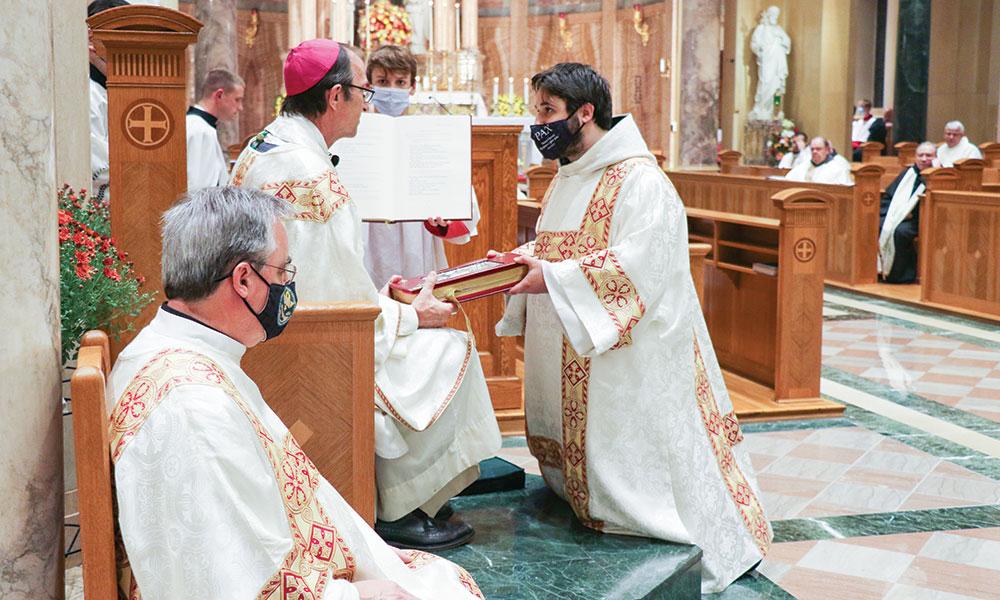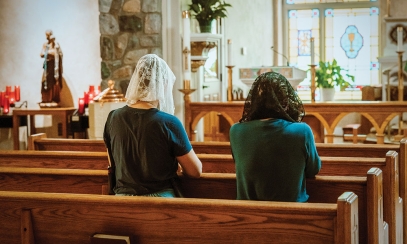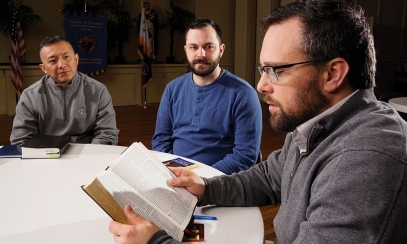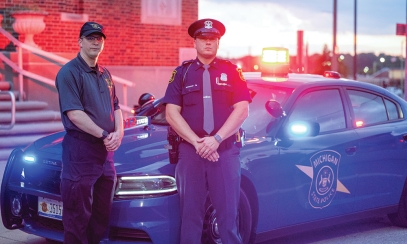
Franciscan Friar from Spokane Ordained a Deacon
On Sept. 30, Friar Thomas Fetz, OFM Conv., was ordained a deacon at the National St. Maximillian Kolbe Shrine at Marytown, in Libertyville, Illinois. While the ordination was far from Eastern Washington, Fetz is familiar to many in the Spokane area. Friar Fetz grew up in the Spokane Valley, first attending St. Mary’s Parish in Spokane Valley and later the Cathedral of Our Lady of Lourdes. His family continues to attend at the cathedral. He graduated from Gonzaga Prep in 2007, but back then he was known as Braden Fetz.
After graduating from high school, Fetz attended the University of Washington. Part of the impetus for choosing UW was hearing one of the campus ministers, a Dominican named Father Thomas Kraft, preach at the cathedral. At UW, Fetz got to know Father Kraft, and Kraft was was influential in his vocation. Fetz said he was drawn to the religious life, and spent time with the Dominican friars in Seattle. He even was able to be present near the end of Father Thomas Kraft’s life. Kraft died in 2009 after a battle with cancer.
As Fetz explored his own vocation, he was drawn to the Conventual Franciscans and his friend, Sister Mary Eucharista, suggested he contact a Spokane native who was at that time in formation with the Conventual Franciscans in Chicago, David Gaines. While Gaines eventually discerned a calling to the diocesan priesthood and returned to Spokane, this connection helped Fetz find a home with the Midwest province of the Conventual Franciscans.
After graduating in three years from the University of Washington, Fetz entered religious life in 2010.
When asked if he had always intended to pursue a priestly vocation as a Franciscan, Friar Fetz said, “I entered with a strong sense of wanting priesthood, but I took my time through discernment to consider it.” As part of his formation as a Franciscan, he was given the opportunity to serve in a hospital setting, participating in what is called Clinical Pastoral Education. Friar Fetz said serving in the hospital had an impact on his own discernment. “I felt called to be a sacramental presence during that time,” he said.
Speaking about his experience in the Franciscans up to this point, Friar Fetz said, “One of the things about living in community is that we learn so much more about ourselves by being with so many different people with different backgrounds. We learn about strengths we didn’t know we have, and our weaknesses.” He continued, “The formation process has not always been easy, I have confronted many of my own wounds from the past, but the Lord has delivered me; every day I grow a little bit more aware of his deliverance.”
His reliance on the Lord in his vocation and life was a theme that Friar Fetz returned to as he described his ministry as a deacon so far, saying, “There is so much responsibility on the shoulders of the ordained. So much expected and so much needed.” He admitted the call can be intimidating for men considering priesthood or religious life. “Since ordination I have realized it’s not about what I cannot do, but what the Lord is doing,” he said. “The Lord provides.”
Friar Fetz continues to prepare for his ordination to the priesthood, which should take place in the summer of 2021. He offered a bit of advice for those discerning priesthood, religious life or marriage: “A frequent fear people have of those in discernment is that people will lose themselves. When following the call, we are made more authentically ourselves. A married couple becomes more authentically themselves. The same in religious live. In following the call, we find ourselves. I have become more authentically Thomas in following the call.”
If you are interested in learning more about vocations to the priesthood and religious life, visit SpokaneVocations.org. If you are interested in learning more about a vocation to the Conventual Franciscan life, visit www.franciscans.org/becoming-a-franciscan
Who are the Conventual Franciscans?
The Conventual Franciscans are one of the three branches of the Franciscan friars, who trace their roots back to St. Francis. The other two are the Order of Friars Minor, and the Capuchin Friars. The Conventual have sometimes been known as the Grey Friars for their grey habit. Some famous Conventual Franciscan saints include St. Maximillian Kolbe and St. Joseph of Cupertino. Learn more about the Conventual Franciscans at www.franciscans.org



